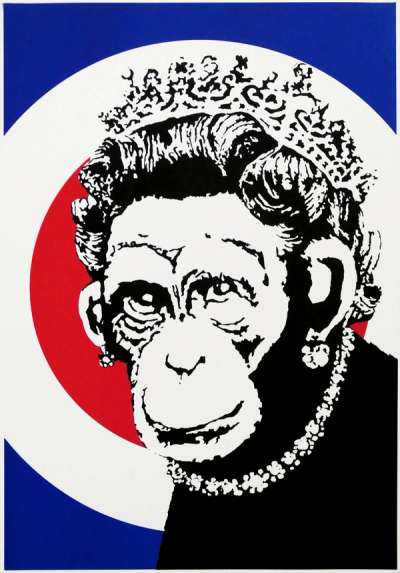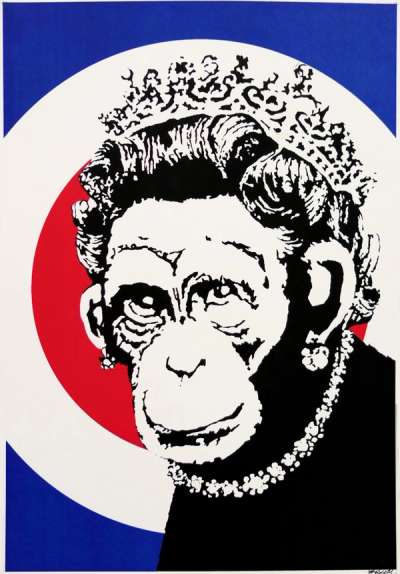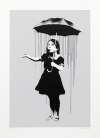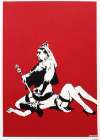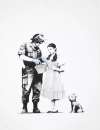Monkey
Queen
Banksy's Monkey Queen is an inflammatory portrait of the late Queen Elizabeth II. The monkey is pictured in the Queen's jewels and her coiffed hair, in front of a mod-style target background. The image was controversial enough to spark ‘Banksygate’ but is only exemplary of Banksy’s defiant anti-authoritarian attitude.
Banksy Monkey Queen For sale
Monkey Queen Value (5 Years)
Works from the Monkey Queen series by Banksy have a strong market value presence, with 78 auction appearances. Top performing works have achieved standout auction results, with peak hammer prices of £54000. Over the past 12 months, average values across the series have ranged from £4632 to £15000. The series shows an average annual growth rate of 18.43%.
Monkey Queen Market value
Auction Results
| Artwork | Auction Date | Auction House | Return to Seller | Hammer Price | Buyer Paid |
|---|---|---|---|---|---|
 Monkey Queen Banksy Signed Print | 19 Nov 2025 | Bruun Rasmussen - Online | £10,200 | £12,000 | £15,000 |
 Monkey Queen Banksy Unsigned Print | 13 Sept 2025 | SBI Art Auction | £7,650 | £9,000 | £10,500 |
Sell Your Art
with Us
with Us
Join Our Network of Collectors. Buy, Sell and Track Demand
Meaning & Analysis
Steeped in anti-royalist sentiment, Banksy’s Monkey Queen was first produced in 2003. The subject of a number of headlines in that same year, the work was dubbed 'disrespectful' by many. Pictures on Walls described the work as a chance to “celebrate the fact that the highest position in British society is not a reward for talent or hard work but is simply handed out with the accident of birth. God Save The Queen”.
It is unsurprising that this Banksy print is one of his most controversial: produced using the artist's trademark stencil technique, it superimposes the monochromatic face of a monkey onto Queen Elizabeth II's iconic portrait. Only the monarch's hair, crown and jewellery are identifiable. The black and white portrait image is set against a target-shaped background; composed of red, white and blue, it evokes the so-called 'Union Jack' flag.
First displayed as a mural at 'The Chill Out Zone' youth club on Broad Street in Newent, Gloucestershire, Monkey Queen became the subject of some controversy when it was moved to pride-of-place in the club's front window. This move invited a swathe complaints from those who believed the the painting was disrespectful to the British monarchy and to the national flag. In the mainstream media, the Monkey Queen controversy was dubbed 'Banksygate'.
In the end, the youth club was asked by the government not to display the image during the Queen’s Golden Jubilee. This raised questions about the right to freedom of speech and freedom of expression in the UK. Following the controversy, The Chill Out Zone replaced the painting with a poster depicting the Union Jack.
